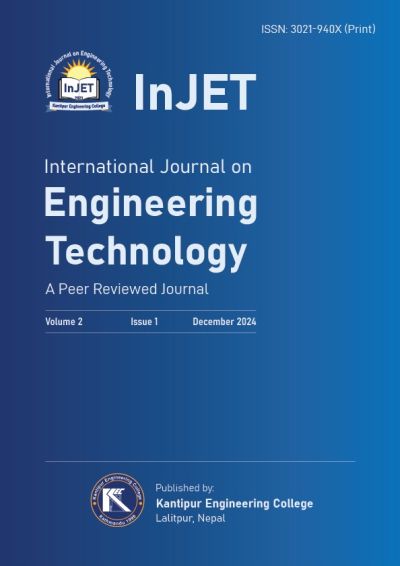Enhancing Electric Bicycle Efficiency: Investigating Regenerative Braking and Pedal Charging Systems
DOI:
https://doi.org/10.3126/injet.v2i1.72561Keywords:
Regenerative Electric Bicycle, Energy Efficiency, Digital Signal Processing, Pedal Charging SystemAbstract
Electric bicycles (e-bikes) are gaining global popularity as part of the broader shift towards electric vehicles (EVs). This research presents a regenerative electric bicycle designed to maximize energy efficiency, aiming for a top speed of 45 km/h and a range of 50 km. The bicycle incorporates two key energy recovery systems: a downhill regenerative system that captures braking energy and converts it into electricity, and a pedal charging system that converts pedaling kinetic energy to recharge the battery. A digital signal processing system seamlessly switches between charging and electric drive based on rider input. This study examines the effectiveness of these systems. The regenerative braking system achieved an impressive 30.9% efficiency in capturing energy during testing. The pedal charging system initially demonstrated an efficiency of 2.98%. MATLAB simulations revealed clear trends in force and power requirements across different grades (0°, 2.5°, 5°, 7.5°, and 10°), highlighting the crucial role of aerodynamic drag and gradient resistance in influencing performance and energy efficiency. While controlled testing environments require further real-world evaluation, these findings underscore the promising potential of regenerative braking and pedal charging for enhancing electric bicycle efficiency. This research paves the way for the development of more efficient and accessible electric bicycles, promoting sustainable transportation solutions through the selection of durable, efficient, and environmentally friendly components.
Downloads
Downloads
Published
How to Cite
Issue
Section
License
Copyright (c) 2024 International Journal on Engineering Technology

This work is licensed under a Creative Commons Attribution 4.0 International License.
This license enables reusers to distribute, remix, adapt, and build upon the material in any medium or format, so long as attribution is given to the creator. The license allows for commercial use.




